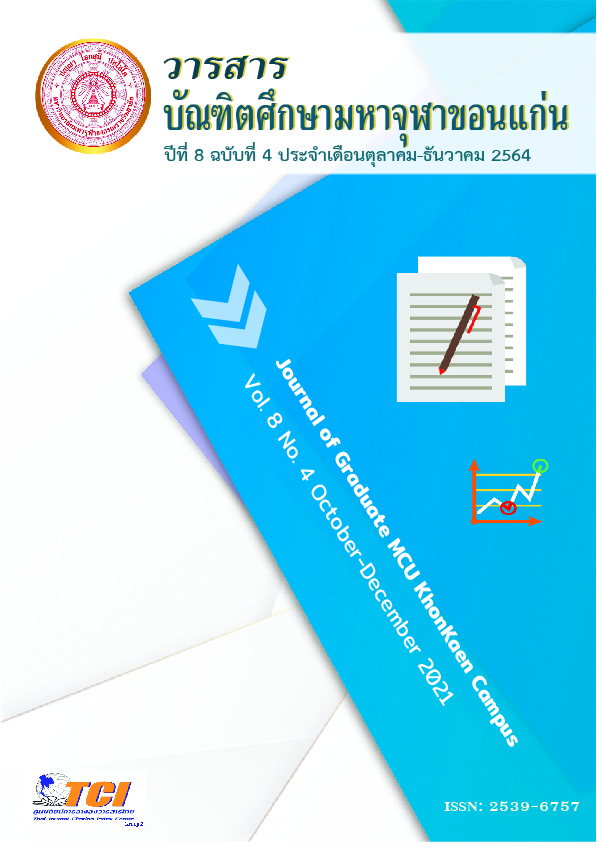การศึกษาวิเคราะห์ปรัชญาในงานศพของชาวพุทธจังหวัดร้อยเอ็ด
Main Article Content
บทคัดย่อ
การวิจัยนี้มีวัตถุประสงค์ 1) เพื่อศึกษาการจัดงานศพของชาวพุทธภาคอีสาน 2) เพื่อศึกษาการจัดงานศพของชาวพุทธจังหวัดร้อยเอ็ด 3) เพื่อศึกษาวิเคราะห์ปรัชญาการจัดงานศพของชาวพุทธจังหวัดร้อยเอ็ด เป็นการวิจัยเชิงคุณภาพ ศึกษาข้อมูลจากพระไตรปิฎก เอกสาร และงานวิจัยที่เกี่ยวข้อง มีผู้ให้ข้อมูลสำคัญจำนวน 25 รูป / คน วิเคราะห์ข้อมูลแบบวิธีพรรณนาตามหลักอุปนัยวิธี
ผลการวิจัยพบว่า
1. การจัดพิธีศพของชาวอีสานเป็นการทำตามประเพณีที่ได้ถือปฏิบัติกันมา เช่น การอาบน้ำศพแต่งตัวให้ศพ และมัดตราสัง และนิมนต์พระสงฆ์มาทำพิธีบังสุกุลแล้วจึงบรรจุศพ และจะตั้งศพไว้เพื่อบำเพ็ญกุศล จึงนำศพไปเผา และไม่นิยมอาบน้ำศพและเผาศพที่ตายโหง ศพตายท้องกลม และศพทารกจะใช้วิธีการฝังดิน
2. การจัดงานศพของชาวพุทธจังหวัดร้อยเอ็ด ยึดคติความเชื่อตามประเพณีภาคอีสานไม่นิยมอาบน้ำและเผาศพที่ตายโหง ตายท้องกลม จะใช้วิธีฝังดิน ส่วนการเก็บศพนั้นขึ้นอยู่ฐานะของญาติผู้ตายแต่ไม่เกิน 3 วัน เพราะไม่มียาฉีดกันเน่าใช้เพียงปูขาว ยาสูบปูรองพื้นโลง ปัจจุบันจะเก็บศพด้วยโลงเย็นจึงเก็บไว้นานเพื่อรอญาติที่อยู่ไกลได้มาร่วมงานศพ
3. แนวคิดปรัชญา มีดังนี้ 1) พุทธอภิปรัชญา มีจะปรากฏในบทสวดมาติกา อภิธรรม ซึ่งเป็นการสาธยายถึงจิต เจตสิก รูป นิพพาน 2) พุทธญาณวิทยา เกิดจากการนำเอาสิ่งที่ได้จากการฟังเทศน์แล้วนำไปพิจารณาจนเกิดเป็นองค์ความรู้ และพิจารณาคติธรรมที่ได้นั้นอย่างต่อเนื่อง 3) พุทธจริยศาสตร์ ได้แก่ ศีล คนไปร่วมงานศพจะได้รับศีลเพื่อสำรวมกายวาจา กุศลกรรมบถ 10 เป็นการสำรวมกาย วาจา ใจ และการพัฒนาปัญญาด้วยการนำเอาคติธรรมที่ได้จากเข้าร่วมงานศพไปใช้ดำเนินชีวิตด้วยความไม่ประมาทตามหลักมัชฌิมาปฏิปทา
Article Details

อนุญาตภายใต้เงื่อนไข Creative Commons Attribution-NonCommercial-NoDerivatives 4.0 International License.
เอกสารอ้างอิง
จรัส ลีกา และคณะ. (2563). การวิเคราะห์คติความเชื่อในการอนุรักษ์ป่าชุมชนของคนอีสาน. วารสารบัณฑิตศึกษามหาจุฬาขอนแก่น, 7(2), 133-149.
พระครูกัลยาณธรรมโฆษ (รุ่ง กลฺยาโณ). (2554). การศึกษาคติธรรมจากประเพณีงานศพกรณีศึกษาชุมชนตำบลตรวจ อำเภอศรีณรงค์ จังหวัดสุรินทร์. วิทยานิพนธ์พุทธศาสตรมหาบัณฑิต, บัณฑิตวิทยาลัย: มหาวิทยาลัยมหาจุฬาลงกรณราชวิทยาลัย.
พระฐตรฐ อธิปญฺโญ (ศิลาศิลป์). (2555). การศึกษาหลักความเชื่อในพิธีศพของชาวพุทธตำบลคูคำที่สอดคล้องกับหลักพุทธธรรม. วิทยานิพนธ์พุทธศาสตรมหาบัณฑิต, บัณฑิตวิทยาลัย: มหาวิทยาลัยมหาจุฬาลงกรณราชวิทยาลัย.
พระธรรมปิฎก (ป.อ.ปยุตฺโต). (2545). พจนานุกรมพุทธศาสตร์ ฉบับประมวลศัพท์. (พิมพ์ครั้งที่ 9). กรุงเทพมหานคร: โรงพิมพ์มหาจุฬาลงกรณราชวิทยาลัย.
พระยงค์ยุทธ เทวธมฺโม (จันทะอ่อน). (2555). การศึกษาวิเคราะห์ปริศนาปรัชญาธรรมในพิธีกรรมงานศพของชาวพุทธ ตำบลบ้านฝาง อำเภอเกษตรวิสัย จังหวัดร้อยเอ็ด. วิทยานิพนธ์พุทธศาสตรมหาบัณฑิต, บัณฑิตวิทยาลัย: มหาวิทยาลัยมหาจุฬาลงกรณราชวิทยาลัย.
พระอธิการสมบัติ ธมฺมานนฺโท (รักษาภักดี). (2555). การศึกษาความเชื่อประเพณีการฝังศพของชาวบ้านเชียงเหียน อำเภอเมือง จังหวัดมหาสารคาม. วิทยานิพนธ์พุทธศาสตรมหาบัณฑิต, บัณฑิตวิทยาลัย: มหาวิทยาลัยมหาจุฬาลงกรณราชวิทยาลัย.
มหาจุฬาลงกรณราชวิทยาลัย. (2539). พระไตรปิฎกภาษาไทย ฉบับมหาจุฬาลงกรณราชวิทยาลัย. กรุงเทพมหานคร: โรงพิมพ์มหาจุฬาลงกรณราชวิทยาลัย.
เสฐียร โกเศศ. (2551). ประเพณีเนื่องในการตาย. กรุงเทพมหานคร: สำนักพิมพ์ศยาม.
อดิศร เพียงเกษ. (2543). หลักธรรมในพระพุทธศาสนาเรื่องบุญบาปที่ปรากฏในผญาอีสาน. วิทยานิพนธ์พุทธศาสตรมหาบัณฑิต, บัณฑิตวิทยาลัย: มหาวิทยาลัยมหาจุฬาลงกรณราชวิทยาลัย.

